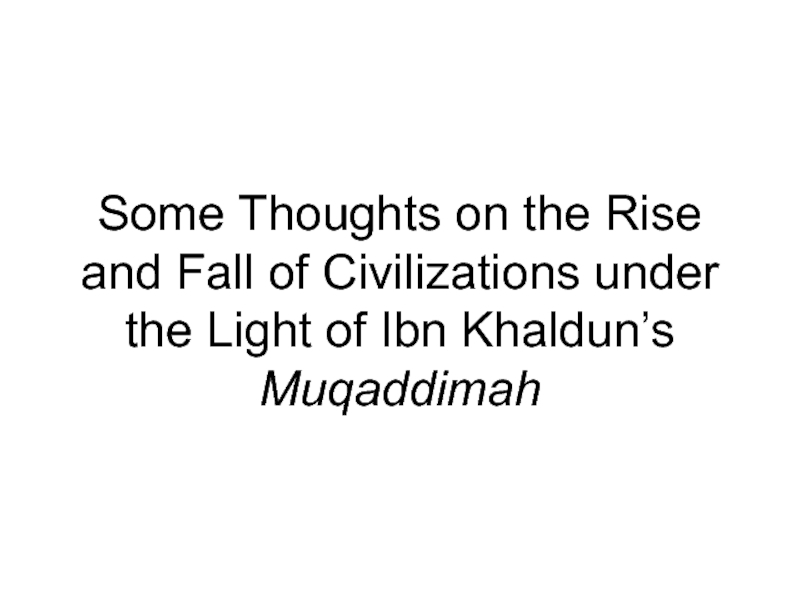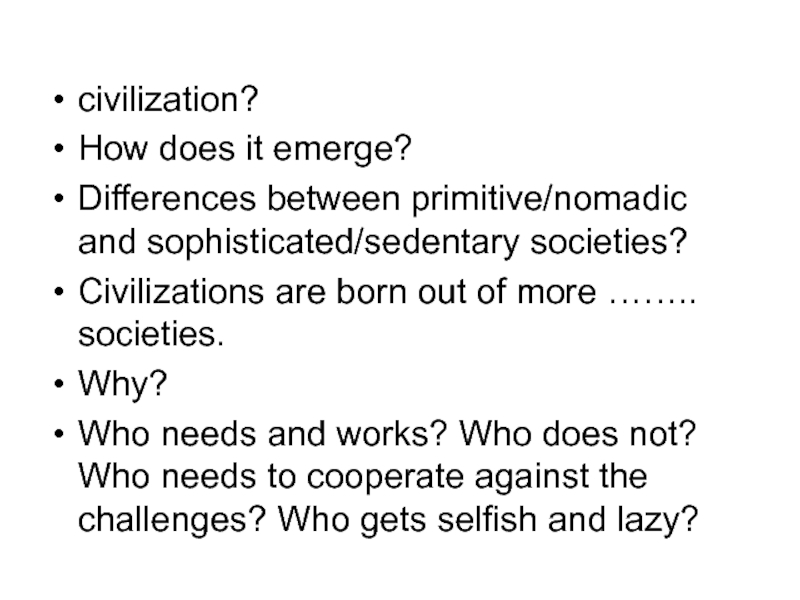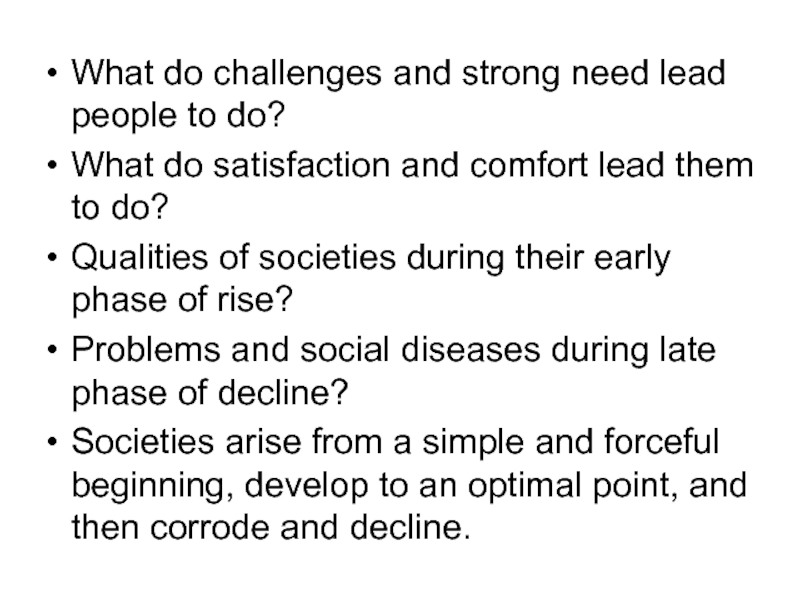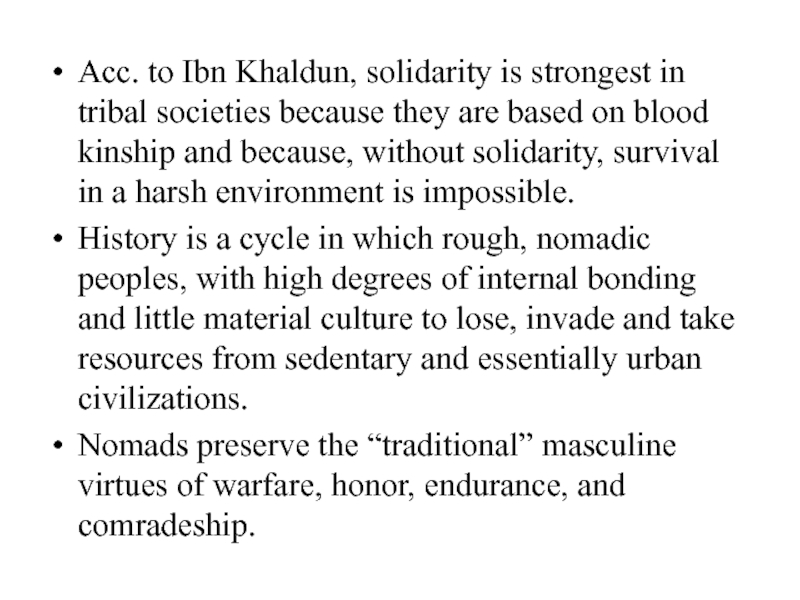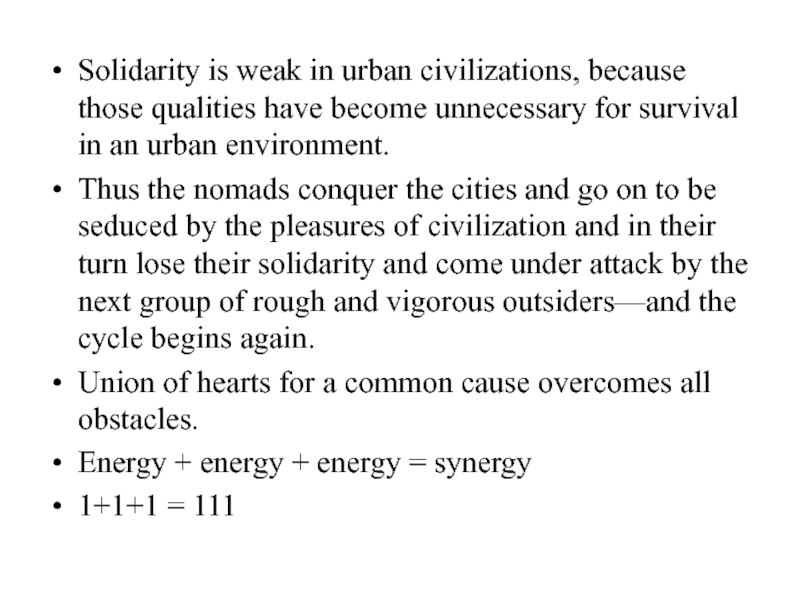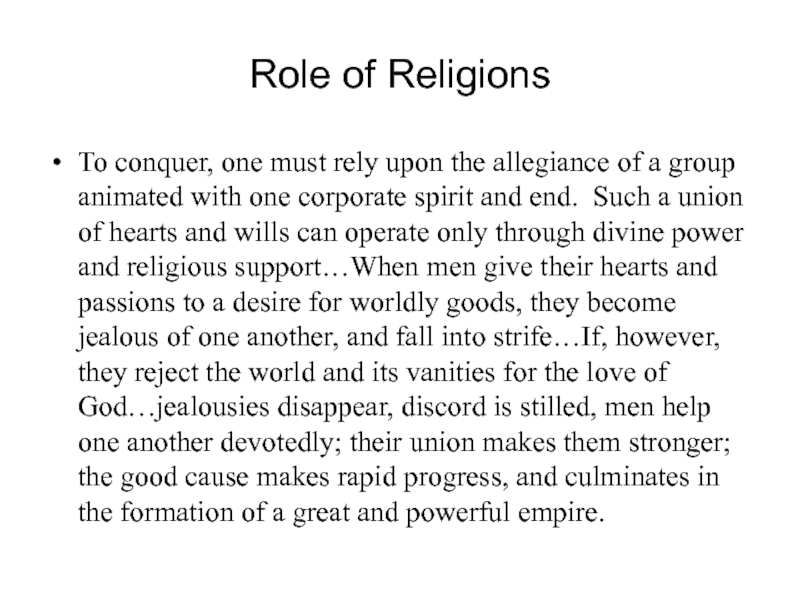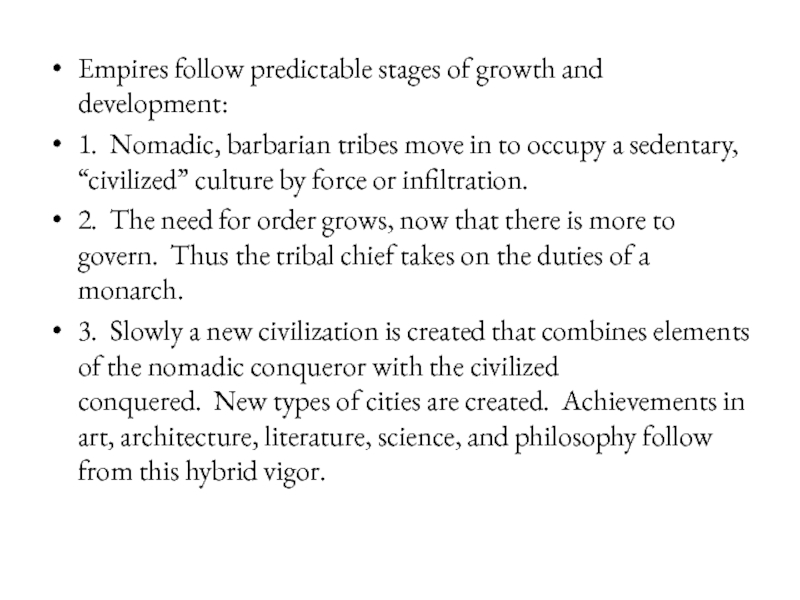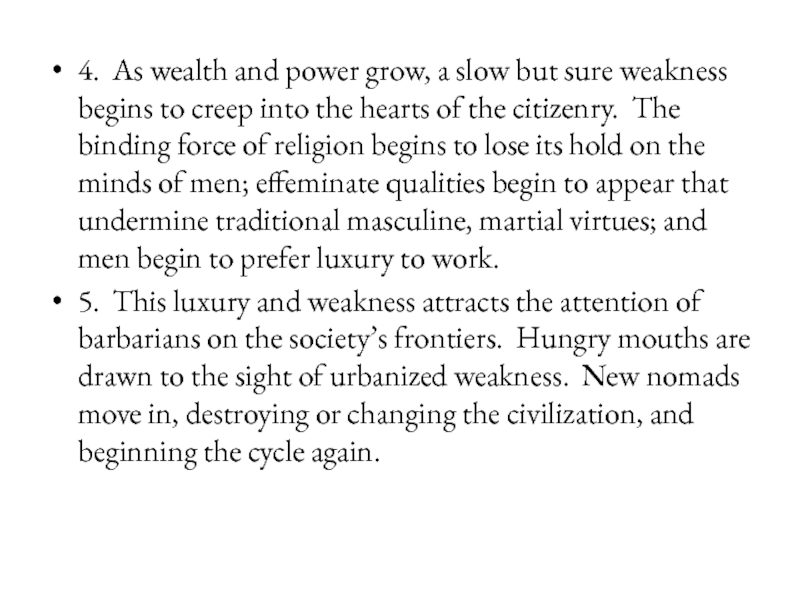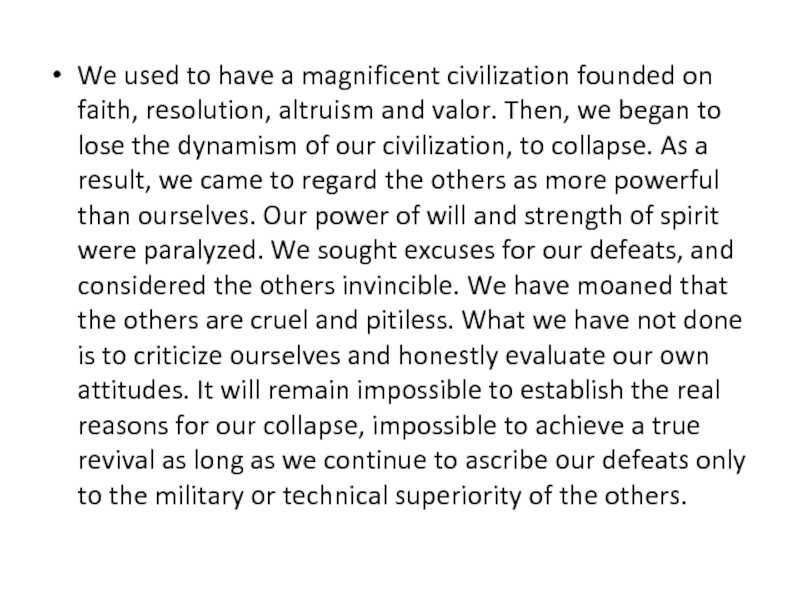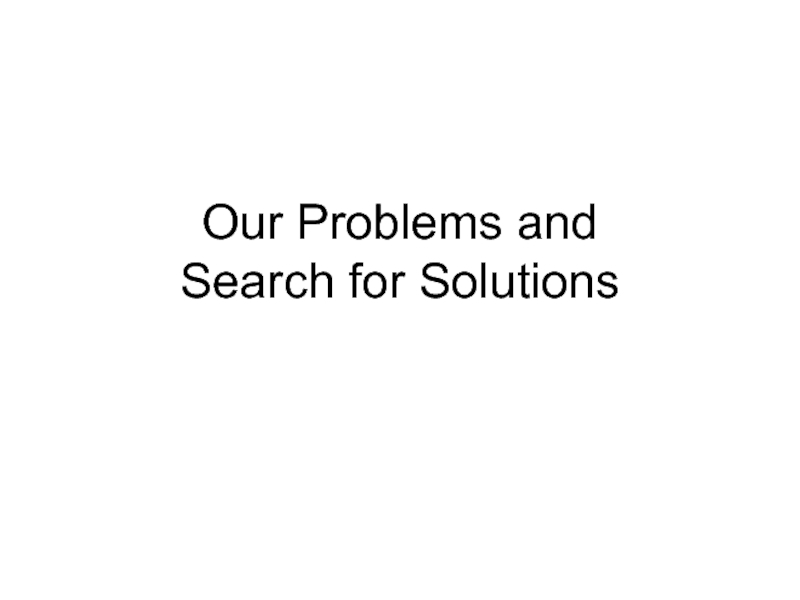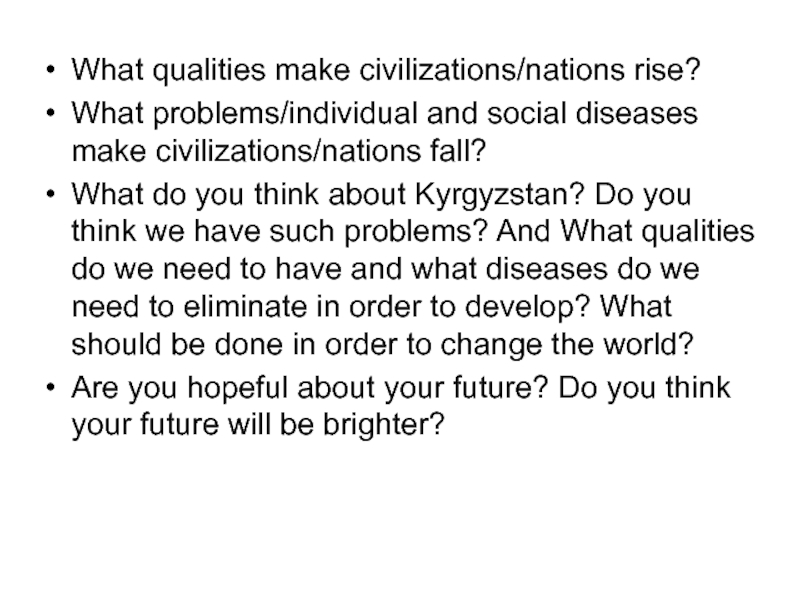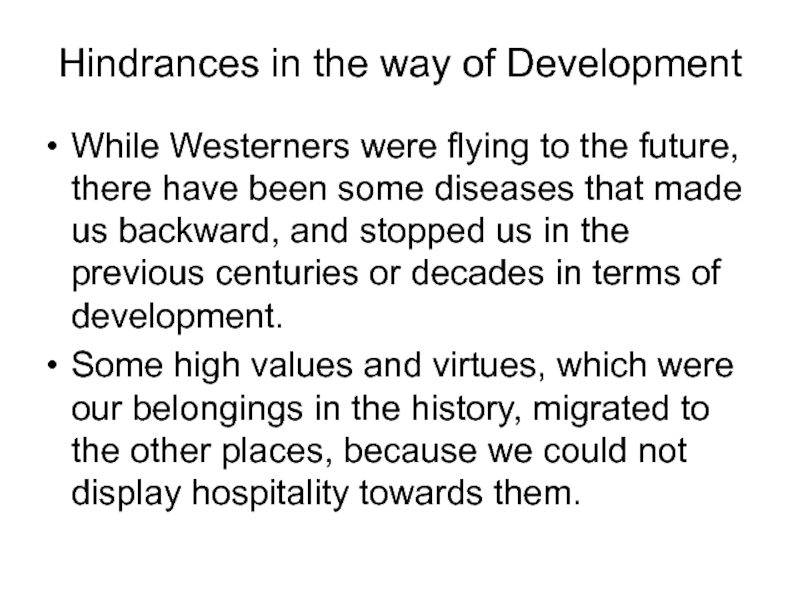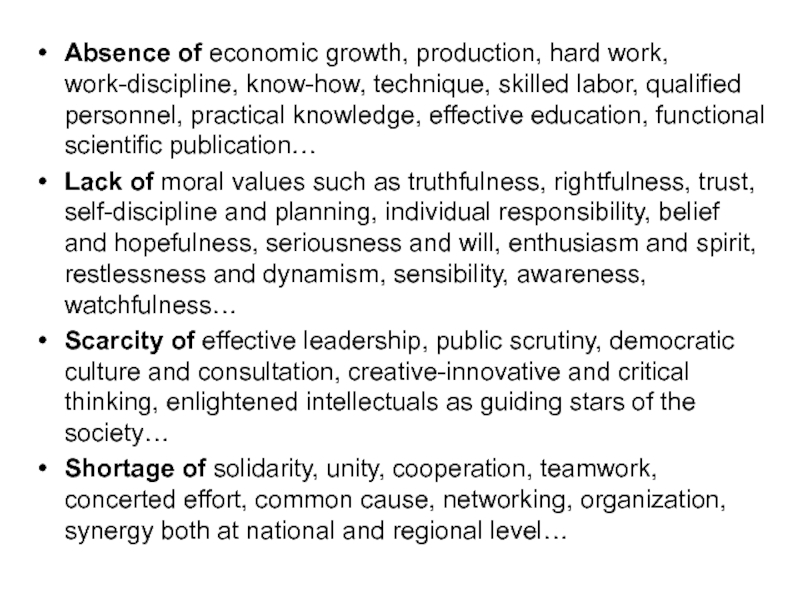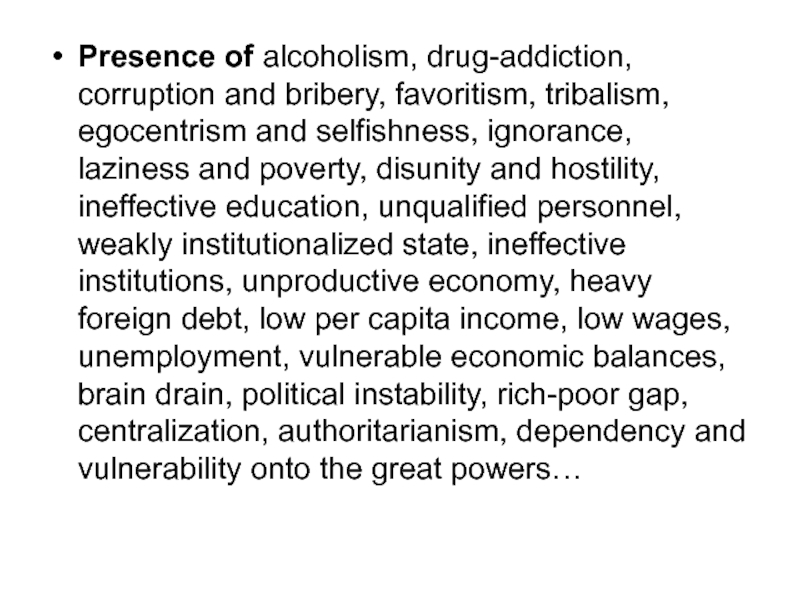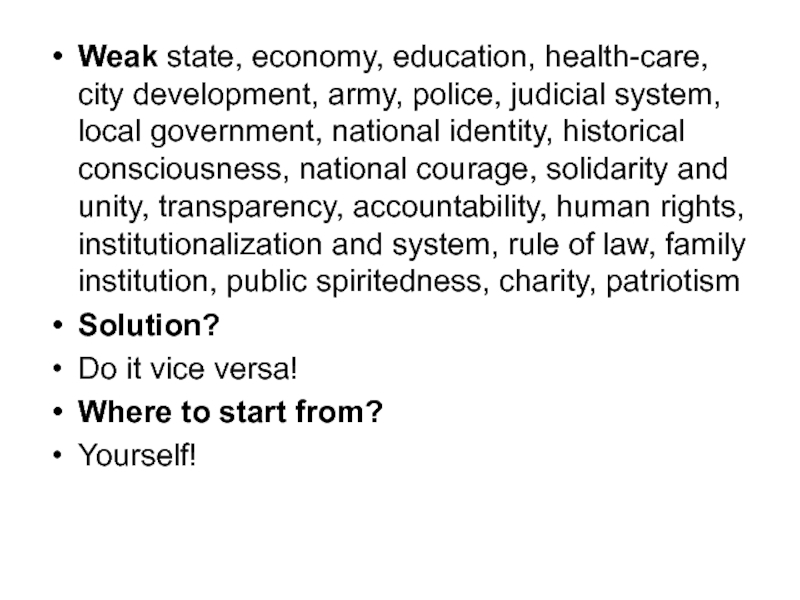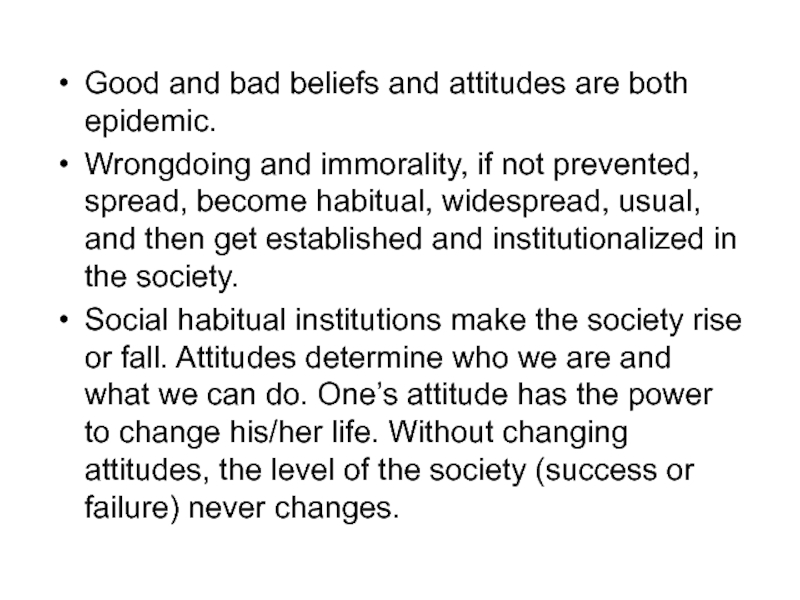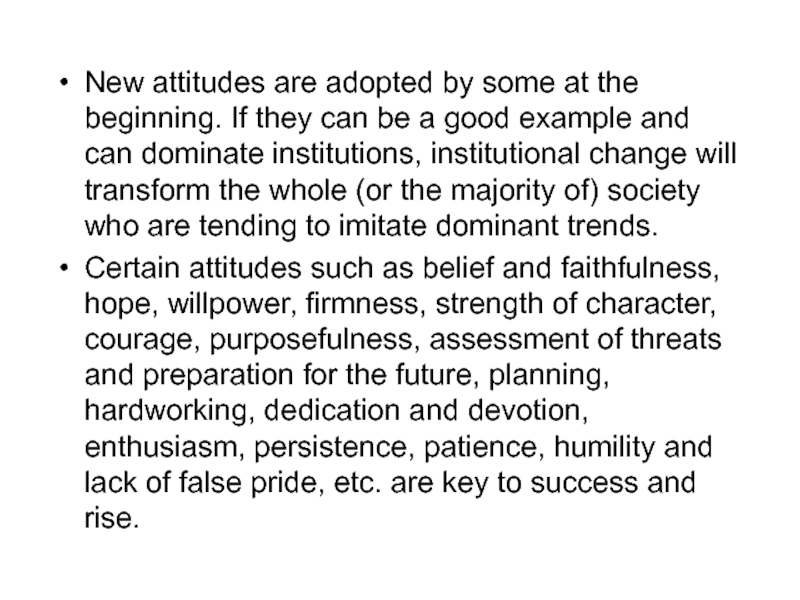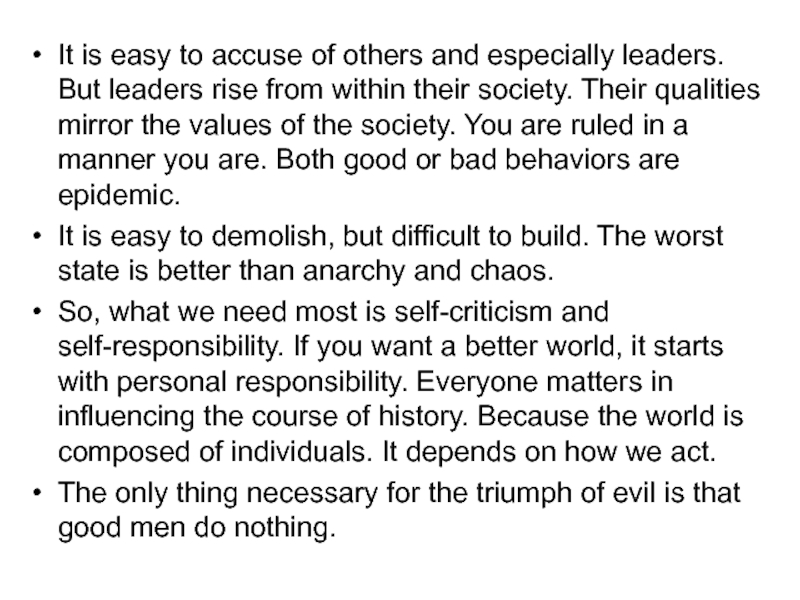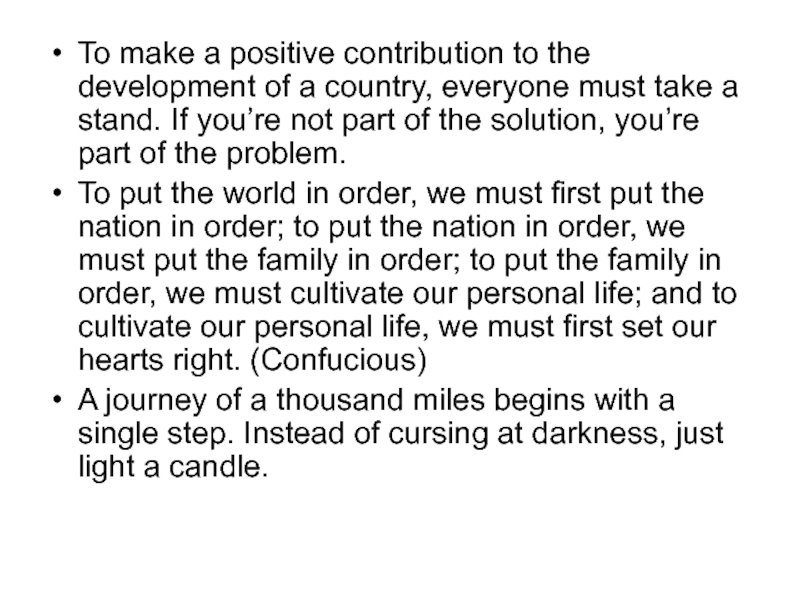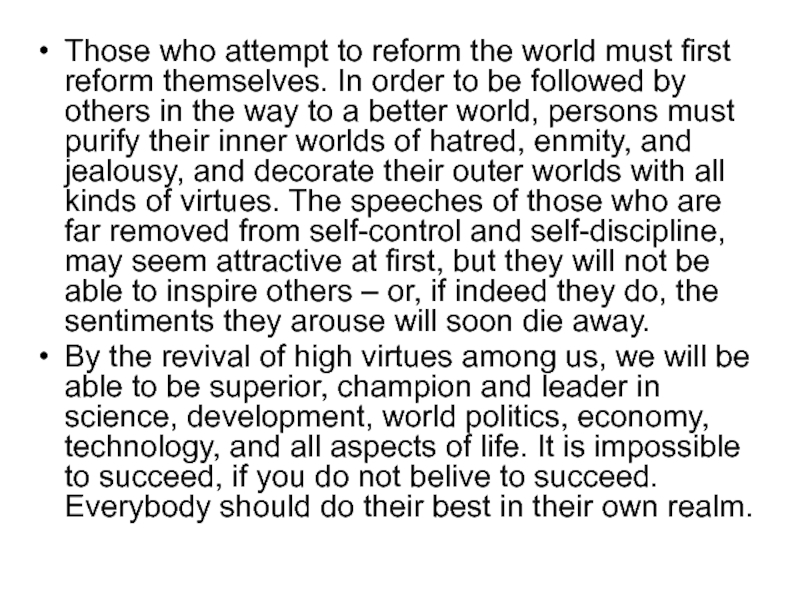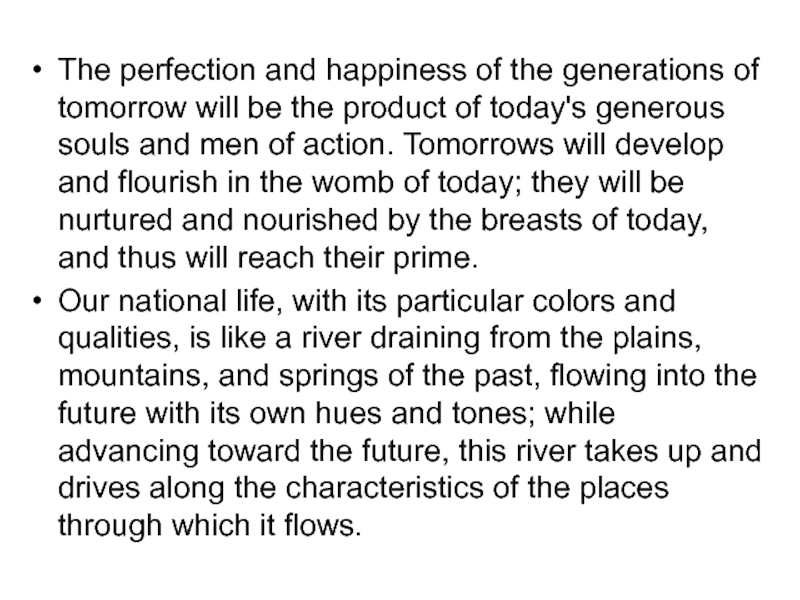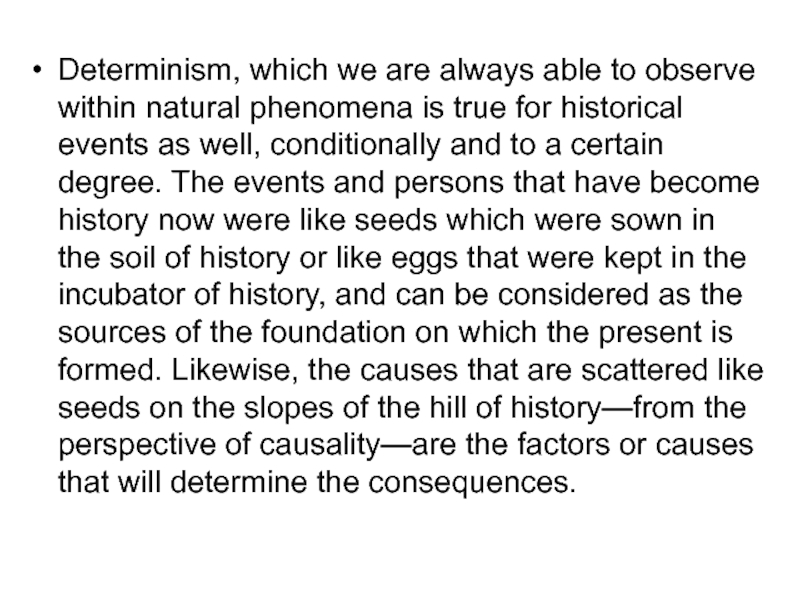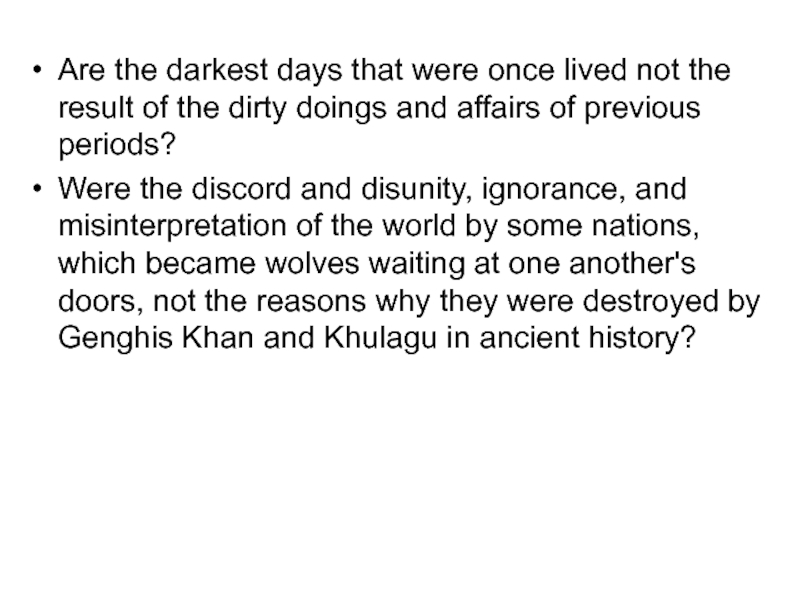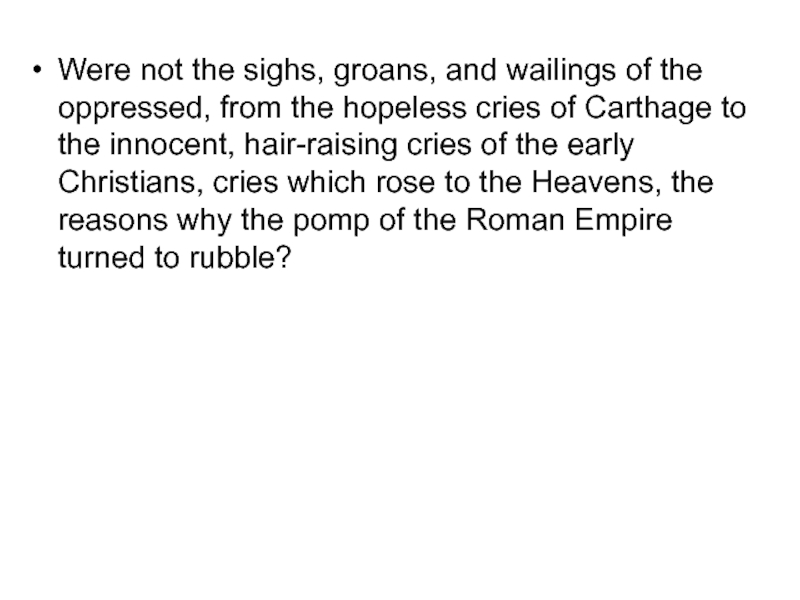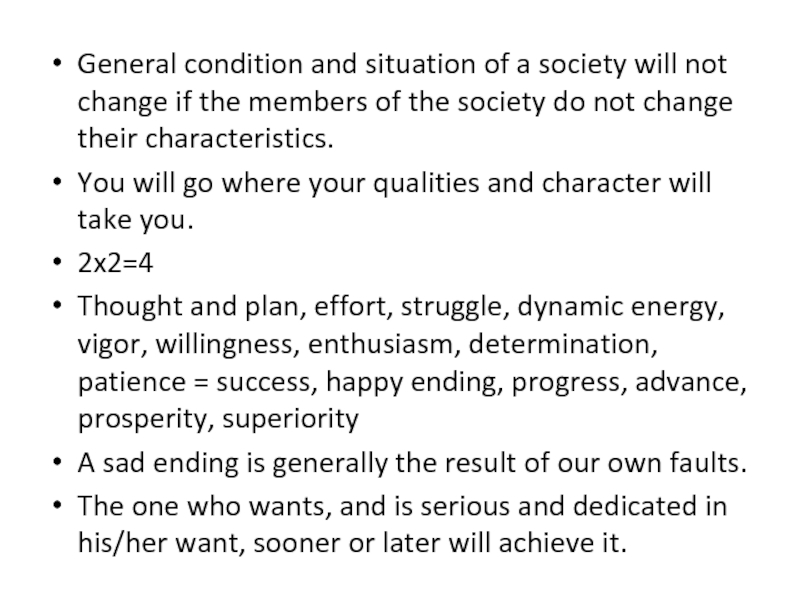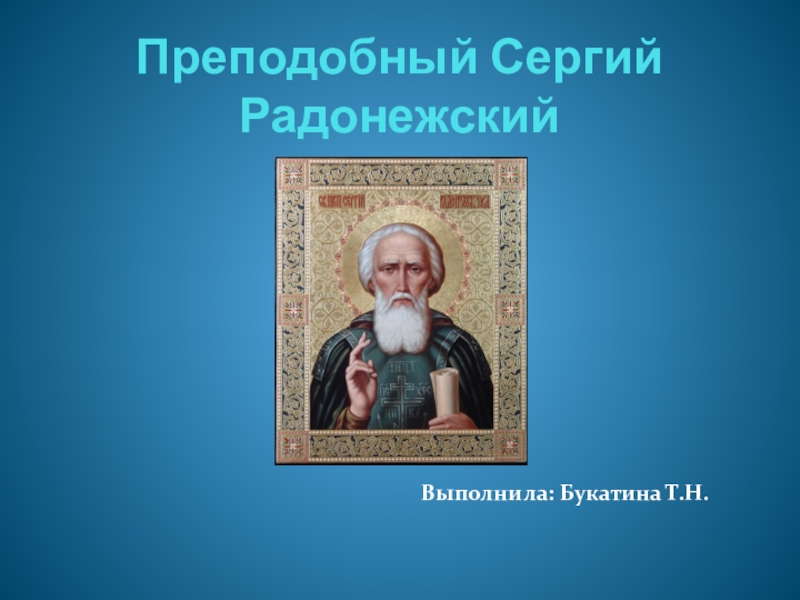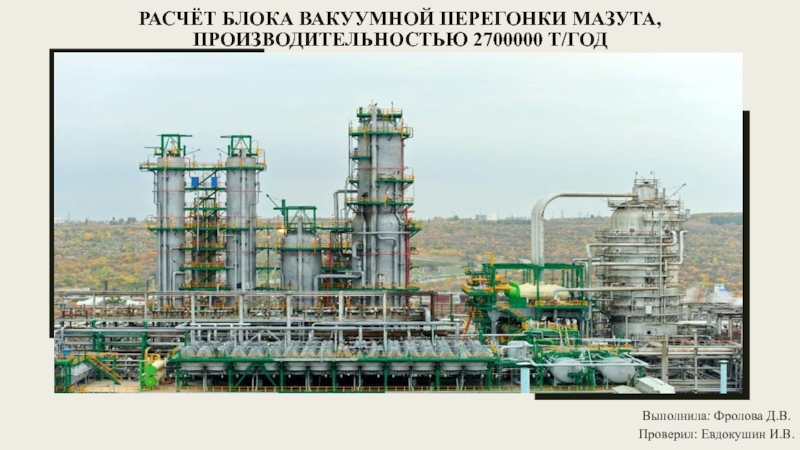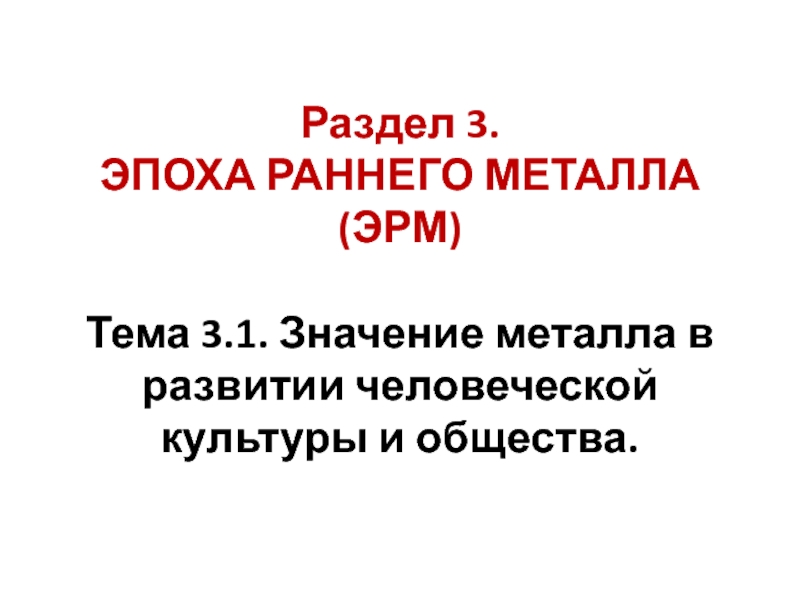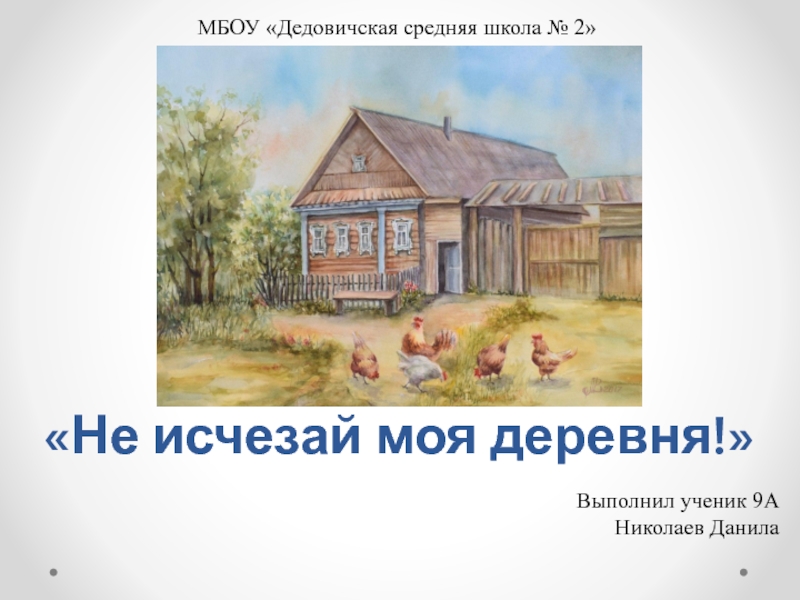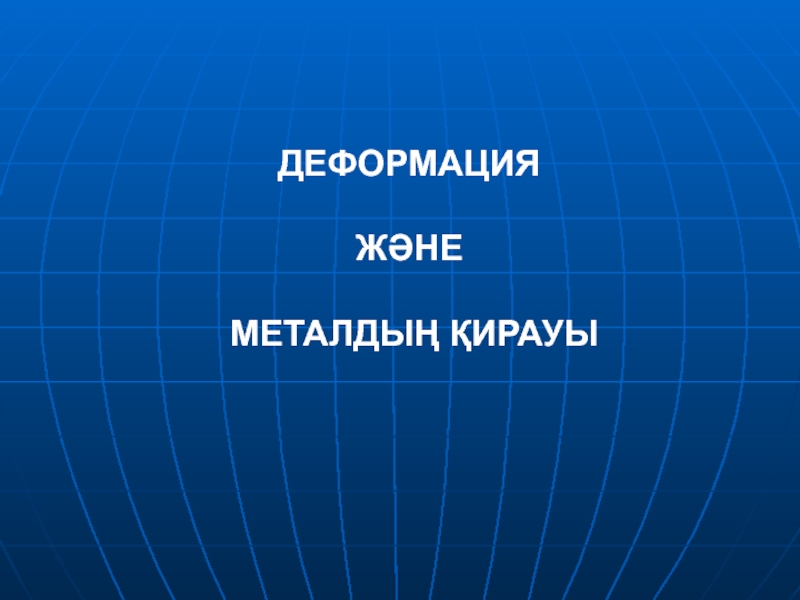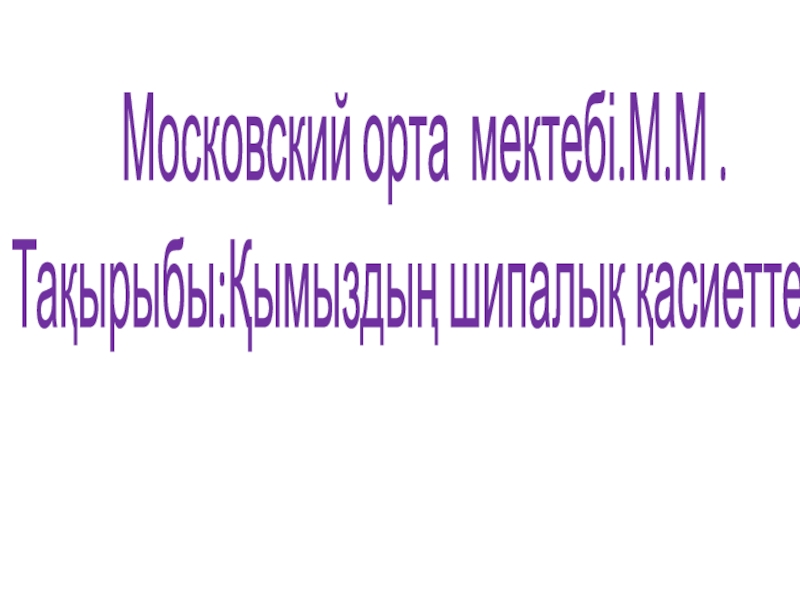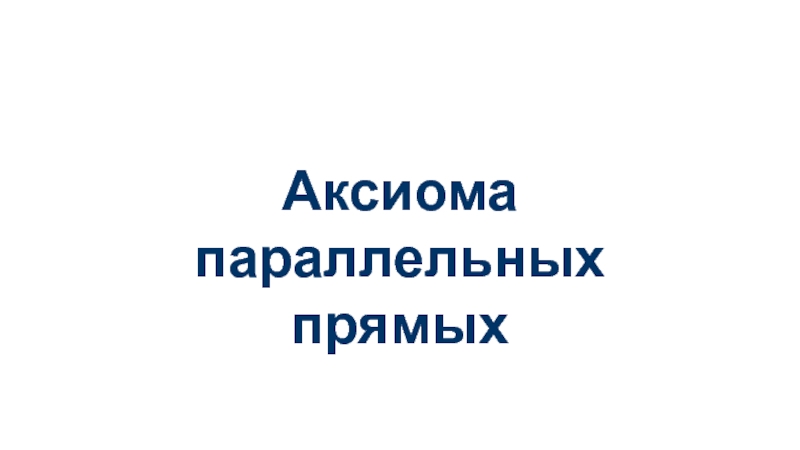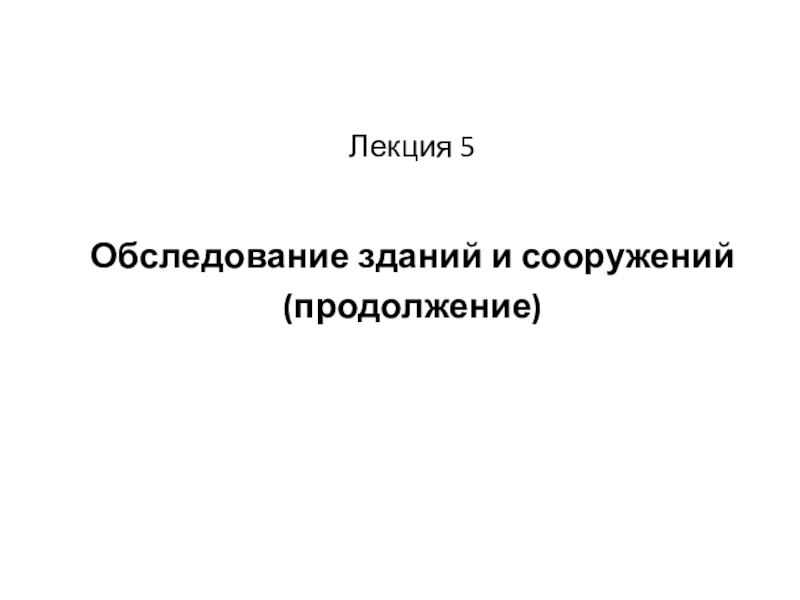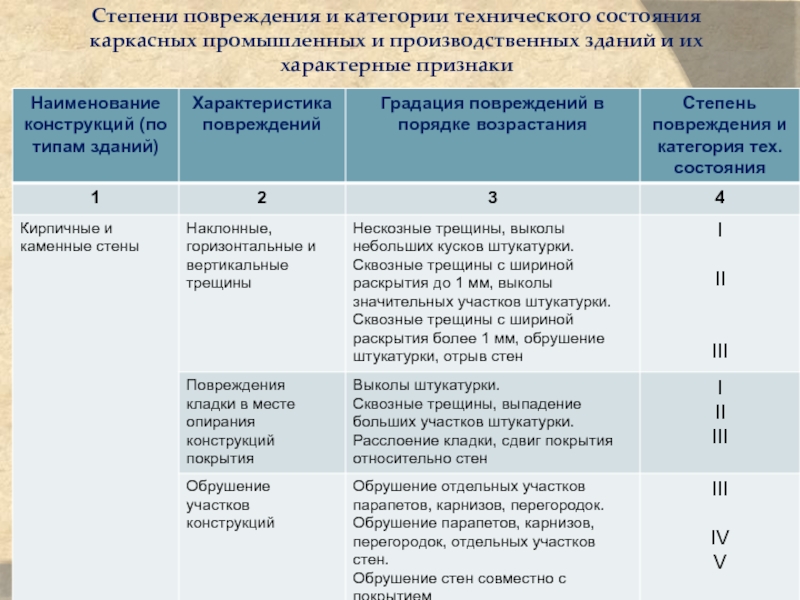Разделы презентаций
- Разное
- Английский язык
- Астрономия
- Алгебра
- Биология
- География
- Геометрия
- Детские презентации
- Информатика
- История
- Литература
- Математика
- Медицина
- Менеджмент
- Музыка
- МХК
- Немецкий язык
- ОБЖ
- Обществознание
- Окружающий мир
- Педагогика
- Русский язык
- Технология
- Физика
- Философия
- Химия
- Шаблоны, картинки для презентаций
- Экология
- Экономика
- Юриспруденция
Some Thoughts on the Rise and Fall of Civilizations under the Light of Ibn
Содержание
- 1. Some Thoughts on the Rise and Fall of Civilizations under the Light of Ibn
- 2. civilization?How does it emerge?Differences between primitive/nomadic and
- 3. What do challenges and strong need lead
- 4. Acc. to Ibn Khaldun, solidarity is strongest
- 5. Solidarity is weak in urban civilizations, because
- 6. Role of ReligionsTo conquer, one must rely
- 7. Empires follow predictable stages of growth and
- 8. 4. As wealth and power grow, a
- 9. We used to have a magnificent civilization
- 10. Our Problems and Search for Solutions
- 11. What qualities make civilizations/nations rise?What problems/individual and
- 12. Hindrances in the way of DevelopmentWhile Westerners
- 13. Absence of economic growth, production, hard work,
- 14. Presence of alcoholism, drug-addiction, corruption and bribery,
- 15. Weak state, economy, education, health-care, city development,
- 16. Good and bad beliefs and attitudes are
- 17. New attitudes are adopted by some at
- 18. It is easy to accuse of others
- 19. To make a positive contribution to the
- 20. Those who attempt to reform the world
- 21. The perfection and happiness of the generations
- 22. Determinism, which we are always able to
- 23. Are the darkest days that were once
- 24. Were not the sighs, groans, and wailings
- 25. General condition and situation of a society
- 26. Скачать презентанцию
civilization?How does it emerge?Differences between primitive/nomadic and sophisticated/sedentary societies?Civilizations are born out of more …….. societies.Why?Who needs and works? Who does not? Who needs to cooperate against the challenges? Who gets
Слайды и текст этой презентации
Слайд 1Some Thoughts on the Rise and Fall of Civilizations under
the Light of Ibn Khaldun’s Muqaddimah
Слайд 2civilization?
How does it emerge?
Differences between primitive/nomadic and sophisticated/sedentary societies?
Civilizations are
born out of more …….. societies.
Why?
Who needs and works? Who
does not? Who needs to cooperate against the challenges? Who gets selfish and lazy?Слайд 3What do challenges and strong need lead people to do?
What
do satisfaction and comfort lead them to do?
Qualities of societies
during their early phase of rise?Problems and social diseases during late phase of decline?
Societies arise from a simple and forceful beginning, develop to an optimal point, and then corrode and decline.
Слайд 4Acc. to Ibn Khaldun, solidarity is strongest in tribal societies
because they are based on blood kinship and because, without
solidarity, survival in a harsh environment is impossible.History is a cycle in which rough, nomadic peoples, with high degrees of internal bonding and little material culture to lose, invade and take resources from sedentary and essentially urban civilizations.
Nomads preserve the “traditional” masculine virtues of warfare, honor, endurance, and comradeship.
Слайд 5Solidarity is weak in urban civilizations, because those qualities have
become unnecessary for survival in an urban environment.
Thus the nomads
conquer the cities and go on to be seduced by the pleasures of civilization and in their turn lose their solidarity and come under attack by the next group of rough and vigorous outsiders—and the cycle begins again.Union of hearts for a common cause overcomes all obstacles.
Energy + energy + energy = synergy
1+1+1 = 111
Слайд 6Role of Religions
To conquer, one must rely upon the allegiance
of a group animated with one corporate spirit and end.
Such a union of hearts and wills can operate only through divine power and religious support…When men give their hearts and passions to a desire for worldly goods, they become jealous of one another, and fall into strife…If, however, they reject the world and its vanities for the love of God…jealousies disappear, discord is stilled, men help one another devotedly; their union makes them stronger; the good cause makes rapid progress, and culminates in the formation of a great and powerful empire.Слайд 7Empires follow predictable stages of growth and development:
1. Nomadic, barbarian
tribes move in to occupy a sedentary, “civilized” culture by
force or infiltration.2. The need for order grows, now that there is more to govern. Thus the tribal chief takes on the duties of a monarch.
3. Slowly a new civilization is created that combines elements of the nomadic conqueror with the civilized conquered. New types of cities are created. Achievements in art, architecture, literature, science, and philosophy follow from this hybrid vigor.
Слайд 84. As wealth and power grow, a slow but sure
weakness begins to creep into the hearts of the citizenry.
The binding force of religion begins to lose its hold on the minds of men; effeminate qualities begin to appear that undermine traditional masculine, martial virtues; and men begin to prefer luxury to work.5. This luxury and weakness attracts the attention of barbarians on the society’s frontiers. Hungry mouths are drawn to the sight of urbanized weakness. New nomads move in, destroying or changing the civilization, and beginning the cycle again.
Слайд 9We used to have a magnificent civilization founded on faith,
resolution, altruism and valor. Then, we began to lose the
dynamism of our civilization, to collapse. As a result, we came to regard the others as more powerful than ourselves. Our power of will and strength of spirit were paralyzed. We sought excuses for our defeats, and considered the others invincible. We have moaned that the others are cruel and pitiless. What we have not done is to criticize ourselves and honestly evaluate our own attitudes. It will remain impossible to establish the real reasons for our collapse, impossible to achieve a true revival as long as we continue to ascribe our defeats only to the military or technical superiority of the others.Слайд 11What qualities make civilizations/nations rise?
What problems/individual and social diseases make
civilizations/nations fall?
What do you think about Kyrgyzstan? Do you think
we have such problems? And What qualities do we need to have and what diseases do we need to eliminate in order to develop? What should be done in order to change the world?Are you hopeful about your future? Do you think your future will be brighter?
Слайд 12Hindrances in the way of Development
While Westerners were flying to
the future, there have been some diseases that made us
backward, and stopped us in the previous centuries or decades in terms of development.Some high values and virtues, which were our belongings in the history, migrated to the other places, because we could not display hospitality towards them.
Слайд 13Absence of economic growth, production, hard work, work-discipline, know-how, technique,
skilled labor, qualified personnel, practical knowledge, effective education, functional scientific
publication…Lack of moral values such as truthfulness, rightfulness, trust, self-discipline and planning, individual responsibility, belief and hopefulness, seriousness and will, enthusiasm and spirit, restlessness and dynamism, sensibility, awareness, watchfulness…
Scarcity of effective leadership, public scrutiny, democratic culture and consultation, creative-innovative and critical thinking, enlightened intellectuals as guiding stars of the society…
Shortage of solidarity, unity, cooperation, teamwork, concerted effort, common cause, networking, organization, synergy both at national and regional level…
Слайд 14Presence of alcoholism, drug-addiction, corruption and bribery, favoritism, tribalism, egocentrism
and selfishness, ignorance, laziness and poverty, disunity and hostility, ineffective
education, unqualified personnel, weakly institutionalized state, ineffective institutions, unproductive economy, heavy foreign debt, low per capita income, low wages, unemployment, vulnerable economic balances, brain drain, political instability, rich-poor gap, centralization, authoritarianism, dependency and vulnerability onto the great powers…Слайд 15Weak state, economy, education, health-care, city development, army, police, judicial
system, local government, national identity, historical consciousness, national courage, solidarity
and unity, transparency, accountability, human rights, institutionalization and system, rule of law, family institution, public spiritedness, charity, patriotismSolution?
Do it vice versa!
Where to start from?
Yourself!
Слайд 16Good and bad beliefs and attitudes are both epidemic.
Wrongdoing
and immorality, if not prevented, spread, become habitual, widespread, usual,
and then get established and institutionalized in the society.Social habitual institutions make the society rise or fall. Attitudes determine who we are and what we can do. One’s attitude has the power to change his/her life. Without changing attitudes, the level of the society (success or failure) never changes.
Слайд 17New attitudes are adopted by some at the beginning. If
they can be a good example and can dominate institutions,
institutional change will transform the whole (or the majority of) society who are tending to imitate dominant trends.Certain attitudes such as belief and faithfulness, hope, willpower, firmness, strength of character, courage, purposefulness, assessment of threats and preparation for the future, planning, hardworking, dedication and devotion, enthusiasm, persistence, patience, humility and lack of false pride, etc. are key to success and rise.
Слайд 18It is easy to accuse of others and especially leaders.
But leaders rise from within their society. Their qualities mirror
the values of the society. You are ruled in a manner you are. Both good or bad behaviors are epidemic.It is easy to demolish, but difficult to build. The worst state is better than anarchy and chaos.
So, what we need most is self-criticism and self-responsibility. If you want a better world, it starts with personal responsibility. Everyone matters in influencing the course of history. Because the world is composed of individuals. It depends on how we act.
The only thing necessary for the triumph of evil is that good men do nothing.
Слайд 19To make a positive contribution to the development of a
country, everyone must take a stand. If you’re not part
of the solution, you’re part of the problem.To put the world in order, we must first put the nation in order; to put the nation in order, we must put the family in order; to put the family in order, we must cultivate our personal life; and to cultivate our personal life, we must first set our hearts right. (Confucious)
A journey of a thousand miles begins with a single step. Instead of cursing at darkness, just light a candle.
Слайд 20Those who attempt to reform the world must first reform
themselves. In order to be followed by others in the
way to a better world, persons must purify their inner worlds of hatred, enmity, and jealousy, and decorate their outer worlds with all kinds of virtues. The speeches of those who are far removed from self-control and self-discipline, may seem attractive at first, but they will not be able to inspire others – or, if indeed they do, the sentiments they arouse will soon die away.By the revival of high virtues among us, we will be able to be superior, champion and leader in science, development, world politics, economy, technology, and all aspects of life. It is impossible to succeed, if you do not belive to succeed. Everybody should do their best in their own realm.
Слайд 21The perfection and happiness of the generations of tomorrow will
be the product of today's generous souls and men of
action. Tomorrows will develop and flourish in the womb of today; they will be nurtured and nourished by the breasts of today, and thus will reach their prime.Our national life, with its particular colors and qualities, is like a river draining from the plains, mountains, and springs of the past, flowing into the future with its own hues and tones; while advancing toward the future, this river takes up and drives along the characteristics of the places through which it flows.
Слайд 22Determinism, which we are always able to observe within natural
phenomena is true for historical events as well, conditionally and
to a certain degree. The events and persons that have become history now were like seeds which were sown in the soil of history or like eggs that were kept in the incubator of history, and can be considered as the sources of the foundation on which the present is formed. Likewise, the causes that are scattered like seeds on the slopes of the hill of history—from the perspective of causality—are the factors or causes that will determine the consequences.Слайд 23Are the darkest days that were once lived not the
result of the dirty doings and affairs of previous periods?
Were the discord and disunity, ignorance, and misinterpretation of the world by some nations, which became wolves waiting at one another's doors, not the reasons why they were destroyed by Genghis Khan and Khulagu in ancient history?
Слайд 24Were not the sighs, groans, and wailings of the oppressed,
from the hopeless cries of Carthage to the innocent, hair-raising
cries of the early Christians, cries which rose to the Heavens, the reasons why the pomp of the Roman Empire turned to rubble?Слайд 25General condition and situation of a society will not change
if the members of the society do not change their
characteristics.You will go where your qualities and character will take you.
2x2=4
Thought and plan, effort, struggle, dynamic energy, vigor, willingness, enthusiasm, determination, patience = success, happy ending, progress, advance, prosperity, superiority
A sad ending is generally the result of our own faults.
The one who wants, and is serious and dedicated in his/her want, sooner or later will achieve it.
